
UNAIDS urges expanding antiretroviral therapy to all people living with HIV
“Everyone, everywhere should have access to treatment,” Simon Bland, Director of the Joint UN Programme on HIV and AIDS (UNAIDS) Office in New York, told reporters at a press briefing at UN Headquarters on Monday.
Meanwhile, UNAIDS Executive Director Michel Sidibé launched a global initiative in Libreville, Gabon, over the weekend that encourages youths to get tested for HIV, calling on young people worldwide to join the movement and get involved in ending the AIDS epidemic.
UNAIDS estimates that 17.1 million of the 36.9 million people living with HIV worldwide do not know they have the virus. Getting tested is a crucial first step for people living with HIV to access life-saving antiretroviral therapy.
Meanwhile, WHO said it is presenting the “treat all” recommendations at a major international AIDS conference taking place this week in Harare, Zimbabwe.
According to the UN health agency, trial results published earlier this year have confirmed that people living with HIV who begin antiretroviral therapy soon after acquiring the virus – before the virus has weakened their immune systems – are more likely to stay healthy and less likely to transmit the virus to their partners.
Those findings led WHO in September to recommend that everyone living with HIV be offered treatment.
The recommendations include using innovative testing strategies to help more people learn they are HIV positive; moving testing and treatment services closer to where people live; starting treatment faster among people who are at advanced stages of HIV infection when they are diagnosed; and reducing the frequency of clinic visits recommended for people who are stable, according to WHO.
“WHO applauds governments, civil society, and organizations that have made availability of life-saving antiretroviral therapy possible in the most trying circumstances. The new recommendation to expand to all people living with HIV is a call to further step up the pace,” said Dr. Winnie Mpanju-Shumbusho, WHO Assistant Director General for HIV/AIDS, Tuberculosis, Malaria and Neglected Tropical Diseases.
According to the agency, “the world is poised to end the AIDS epidemic by 2030 – provided it can accelerate the pace of progress achieved globally over the past 15 years.”
Since 2000, an estimated 7.8 million lives have been saved, fewer people are acquiring HIV, and projections of an end to the epidemic by 2030 – a goal once considered unattainable by many experts – are now realistic, according to the WHO report, Global Health Sector Response to HIV 2000-2015.
WHO Director-General, Dr. Margaret Chan said “the Millennium Development Goal of reversing the HIV epidemic was reached ahead of the 2015 deadline - an incredible achievement that testifies to the power of national action and international solidarity.”
Over the last 15 years, scale-up of antiretroviral therapy (ART) has been most dramatic in the WHO African Region where now more than 11 million people are receiving HIV treatment, up from 11,000 at the turn of the century, WHO said, adding that “People living with HIV in Africa are now more likely to receive treatment than people living in most other parts of the world.”
Reducing the number of new HIV infections remains a major focus for the vision of ending AIDS.
WHO said over the last five years in Africa some 10 million men have undergone voluntary medical circumcision, a procedure that reduces their risk of acquiring HIV by 60 per cent.
And the same drugs that keep people living with HIV from becoming sick also prevent transmission of the virus from pregnant women to their infants.
Among the 22 countries that account for 90 per cent of new HIV infections, 8 have reduced new infections among children by more than 50 per cent since 2009, based on 2013 data, and another 4 are close to that mark.
“The sense of urgency that was the norm during the disease’s most-destructive years must not be allowed to abate,” WHO’s Dr Mpanju-Shumbusho said. “HIV remains a major health challenge.”
Photo: UNICEF/Shehzad Noorani/www.justearthnews.com
Support Our Journalism
We cannot do without you.. your contribution supports unbiased journalism
IBNS is not driven by any ism- not wokeism, not racism, not skewed secularism, not hyper right-wing or left liberal ideals, nor by any hardline religious beliefs or hyper nationalism. We want to serve you good old objective news, as they are. We do not judge or preach. We let people decide for themselves. We only try to present factual and well-sourced news.







